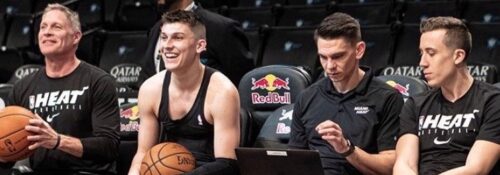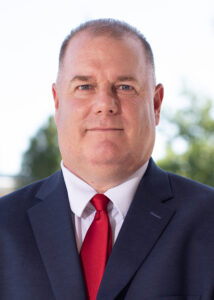
The Shooting Guy: Rob Fodor, ’84, Builds Successful Career in Basketball with the NBA’s Miami Heat
Written by Doug Goodnough
Remember those Dos Equis television commercials featuring “the Most Interesting Man in the World?”
He has nothing on Rob Fodor, ’84.
The 1984 Hillsdale College graduate has worn many career hats over the years.
Manager at an auto dealership.
Food truck owner.
Model.
Teacher.
Professional speaker.
He even ran (unsuccessfully) for Congress in Michigan’s 15th District.
But for Fodor, his ultimate path to success came through basketball. As a high school standout in the Detroit area, he honed his skills at the famed St. Cecilia’s in Detroit against some of the best players in the world, including the likes of NBA greats such as George Gervin. After a standout college career at Hillsdale, where he remains the school’s all-time assist leader, he desperately wanted a professional basketball career, but a series of injuries derailed those hopes.
After trying his hand at several career paths, he eventually returned to basketball and decided to help others through coaching and teaching. Using what he calls his “Fodor” graphic memory, he delved into the science of basketball, particularly shooting. Developing his own unique philosophy based on what he learned in areas like anatomy, physiology, kinesiology, geometry, biomechanics—even neuroscience—Fodor has carved out a remarkable career teaching others how to shoot a basketball. In fact, he is entering his seventh year as the full-time shooting coach of the NBA’s Miami Heat. And he has his own consulting business, “The Shooting Guy,” which is “dedicated to the science of player development.”
Fodor continues to learn, continues to grow, and continues to lead a “most interesting” life.
Basketball “Taught Wrong”
Fodor, whose father and grandfather both played professional baseball, settled on basketball as his early sport of choice. After a standout high school and collegiate playing career, Fodor had several opportunities to play professional basketball overseas, but all were eventually derailed by injury. In fact, he decided to walk away from the game for nearly seven years and took up golf, deciding that he might pursue that as a professional interest. After a successful 2-on-1 contest with a couple of “basketball freaks” he met at a golf course, however, he decided that maybe it was time to revisit his involvement with the game, particularly the aspect of shooting.
“I didn’t miss a shot for 15 minutes,” he said. “It was like I never left (basketball).”
Fodor studied basketball and created a system of shooting that is uniquely his. “If you studied basketball like I did, you saw that there are a lot of problems in the game that were the same, and have been the same forever,” he said. “Basketball has always been taught wrong.”
In other sports, people learn how to move before they learn how to become the best in their field. Not so in basketball, according to Fodor.
“You just taught yourself how to move your body around the ball,” he said of the sport’s conventional thinking. “That’s absolutely backwards. The ball is an implement, and you’re supposed to learn how to move your body and attach your implement. That’s how all the other sports work. But basketball wasn’t taught that way.”
So in learning how to shoot, he said the solution “did not lie within basketball.”
He studied anatomy and physiology, kinesiology and other areas to learn how to “rewire” the body how to move. He also studied gymnasts, ice skaters—even cats—to come up with the philosophy he uses today.
“When cats get scared, their bodies get really low to the ground. Their feet get wide. Their eyes and chin go up and they are trying to figure out, ‘Where am I going to escape to?’ We have that same ‘fight or flight’ response. But how do I harness that into a skill, and then, how do I teach it?”
Turning Up the Heat
Fodor quickly developed a reputation for his craft. At the invitation of some friends, he gave a lecture and demonstration of his technique—missing only one out of 110 shots—at a basketball camp in Massachusetts. From there, he helped start several shooting camps, and he was soon developing a business.
When Fodor was working as a high school teacher and coach in Coconut Grove, Florida, a couple of teaching colleagues invited him to play in Miami’s open league, which featured many professional athletes who played to keep in shape during the offseason. After one game where Fodor scored a whopping 48 points, others took note.
One of those players was Mike James, a standout college player trying to make the Miami Heat’s roster. He asked Fodor to be his shooting coach, and Fodor worked with James at the Heat’s home court. James eventually made the roster, and Fodor eventually met the Heat’s director of player development, Eric Spoelstra. After briefly watching Fodor in action, Spoelstra—who eventually became the Heat’s head coach—was impressed to the point that he hired him as the team’s shooting consultant in 2005. Three NBA championships later, when Fodor decided he wanted to leave the Miami area, Spoelstra made him an offer he couldn’t refuse. In 2016, Fodor became the Heat’s first full-time shooting coach.
Miami has led the NBA in three-point shooting two out of the last five years. The Heat have recorded their six highest single-season totals for three-point field goals made, and during the 2021-22 season set the franchise record for points in a season.
One of Fodor’s first full-time assignments was working with former Duke star Justise Winslow, a Miami first-round draft pick in 2015. After two years of subpar three-point shooting totals, Winslow shot a career-best 38 percent in 2017 and 37.5 percent in 2018 under Fodor’s tutelage.
Working with under-the-radar talents such as Duncan Robinson, Tyler Herro, and Kendrick Nunn, Fodor’s system showed results on the court. In 2020, the Heat made a run to the NBA Finals, much of it due to their three-point shooting.
“I try to direct the players, but they have done it all,” he said. “They are the ones who have been doing the work and instilling the belief, and they have to go out and perform under pressure. We’ve had a lot of success. I’ve been in three (NBA championship) parades. It’s been a pretty cool run for sure.”
Fodor now works remotely and coaches players through Zoom meetings and phone calls while living in northern California. He said he still travels with the team occasionally, and calls the NBA experience “fascinating.”
“What we do in the NBA is so difference from what people think,” he said. “The amount of information that we go through just to play one game in the regular season is stunning. When you’re playing against an MVP-caliber player, you’re trying to figure out how to beat them just one time. And the series are just great. In a seven-game series, you focus on one thing: them. It’s a really high-speed chess match with the best players on the planet.”
A Renaissance Man
Fodor’s “The Shooting Guy” business is growing by the day. Soon, he is launching an online subscription shooting service for coaches. With a resume that includes coaching NBA MVPs, NBA three-point champions, Olympic gold medalists as well as WNBA and European stars, Fodor has developed an international reputation for his shooting system.
“The way I teach shooting is my own,” he said. “And the way that I teach to move is my own. If you live by the premise that basketball has always been taught wrong, where do you go to learn? I did it because obviously I love the game, but I also wanted to help my friends. It just happens that my friends were high-level basketball people.”
Fodor is more than a shooting coach. Still a championship-level golfer, he is also an avid fisherman. And his business interests venture beyond the realm of basketball; he is a “facilitator” in the emerging field of quantum resistance encryption. This is leading to the development of quantum computers, which Fodor said is driving artificial intelligence systems. He is also a proud father of his daughter, Taylor, a former standout college softball pitcher, and grandfather to three-year-old Wyatt.
When Fodor enrolled at Hillsdale, he decided to major in history with plans to become a lawyer. Basketball eventually changed those plans, but he is grateful for the athletic and educational opportunities Hillsdale provided.
“I’m a constant learner,” Fodor said. “If you have a fascination for life, there’s always things out there for you to go learn and do. Hillsdale sets you up to have a good basis for how you should live your life.”
Doug Goodnough, ’90, is Hillsdale’s director of Alumni Marketing. He enjoys connecting with fellow alumni in new and wonderful ways.
Published in January 2023
